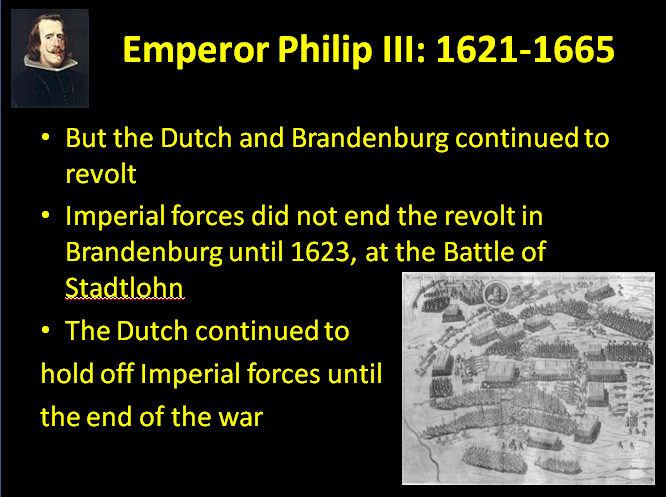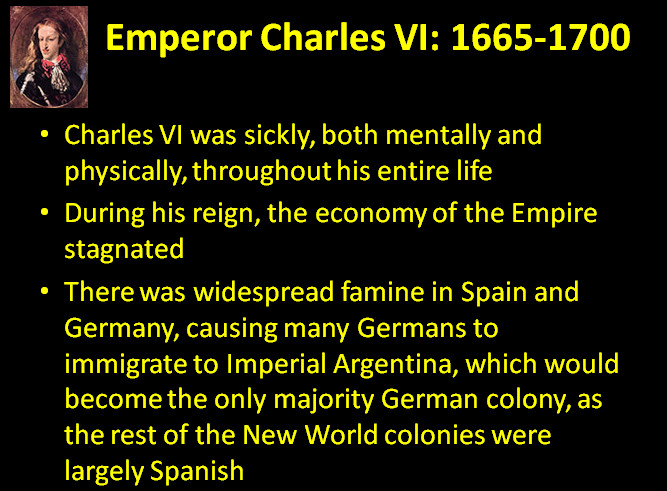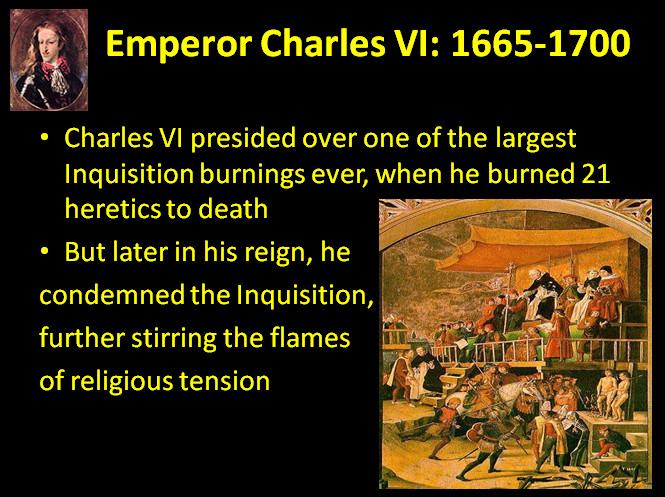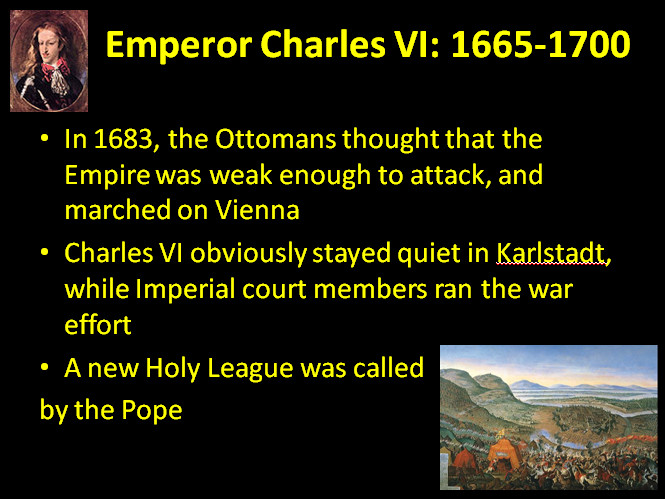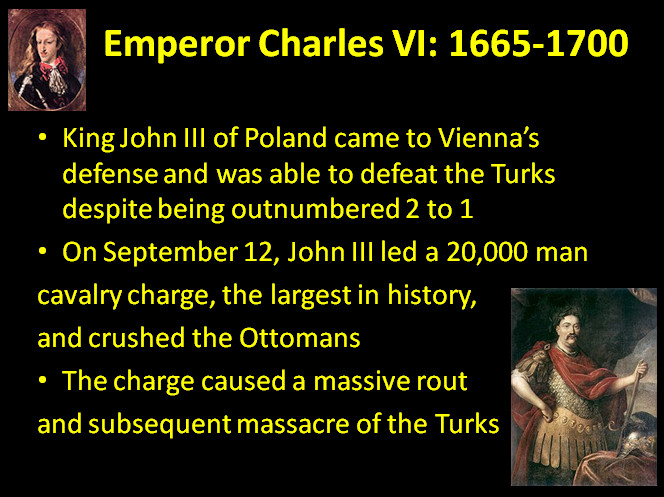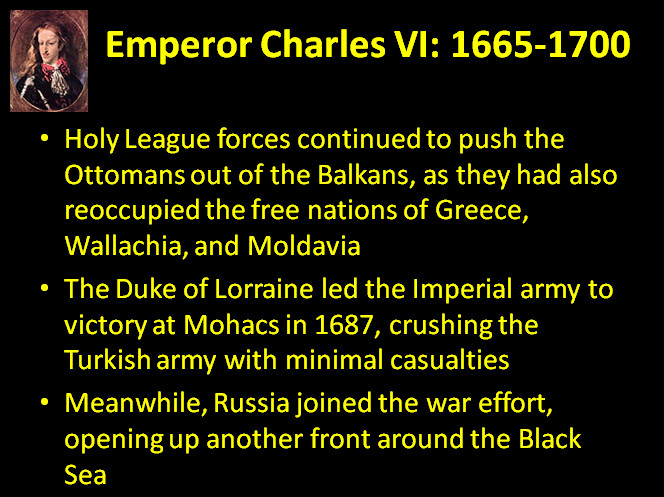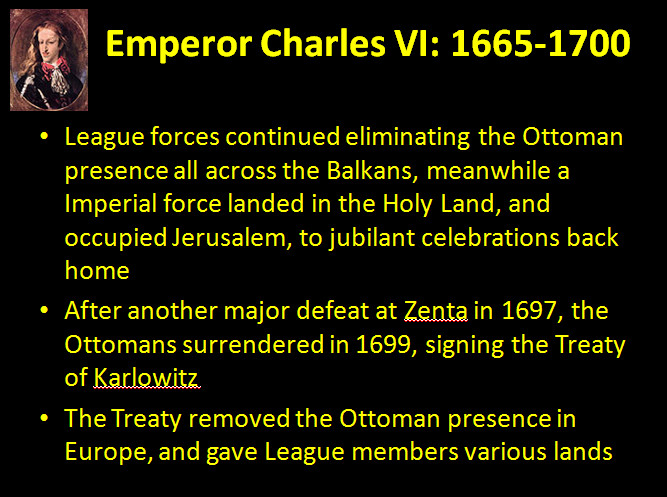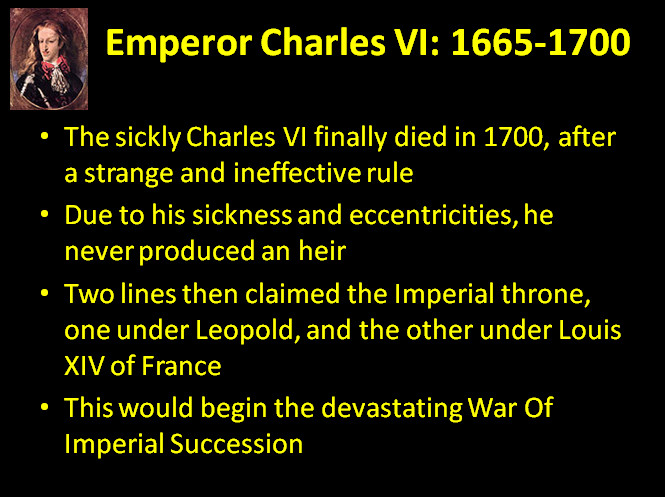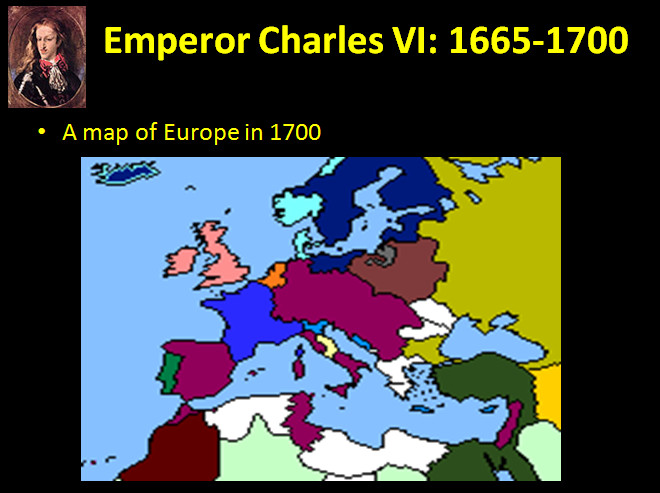Philip III: 1621-1665
OK, welcome back to class. Last week we talked a little bit about the beginning of one of the most drastic wars in Imperial history, the Thirty Years' War. Before going on to the war itself and the reign of Philip III, I feel as if many of you may be confused as to how an event like a bunch of priests being thrown into a pile of manure could have caused a continent wide war. Well, first of all, it wasn't this sole event that caused the war. The frustrations of Protestants in the Empire had been increasing, and a rebellion had been in the works for some time. And tensions with other nations in Europe were also rising, as they saw the Empire as an increasingly unbeatable behemoth. So when the Protestants across the Empire rose up in open revolt, other nations throughout Europe gladly joined in, seeing their chance to destroy the Empire. We have to understand that during it's "Golden Age," the Empire wasn't really as powerful as it seemed. It was multicultural, religious, and lingual, and history shows that empires such as that are doomed to fall. So, despite it's size and superficial strength, it was hanging by a thread, and the Defenestration of Prague cut that thread. But the Empire might have fallen much harder had it not been for the skilled Philip III, who we'll learn about today.
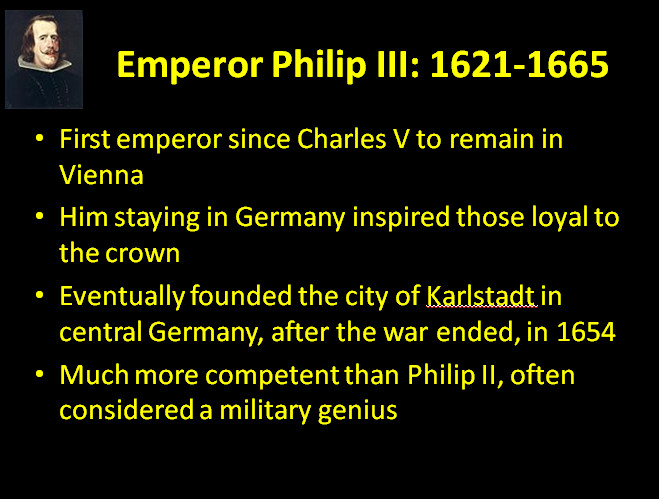
He was unlike his father and grandfather. He chose to stay in Vienna, and was considered the first true German emperor in a long time. By staying in Vienna, even when the entire area was surrounded by conflict and under threat, he inspired many to remain loyal to the crown. He was a military genius, who during the war was instrumental in directing troop movements and innovating strategies. After the war had ended, he went on to found a new capital in central Germany called Karlstadt, and excuse PowerPoint again that is actually the correct spelling. Karlstadt was indeed named after Charles V and Charlemagne, and its centralized location in Germany made loyal Germans feel that they had their empire back, but alienated many of the other cultures within the Empire.
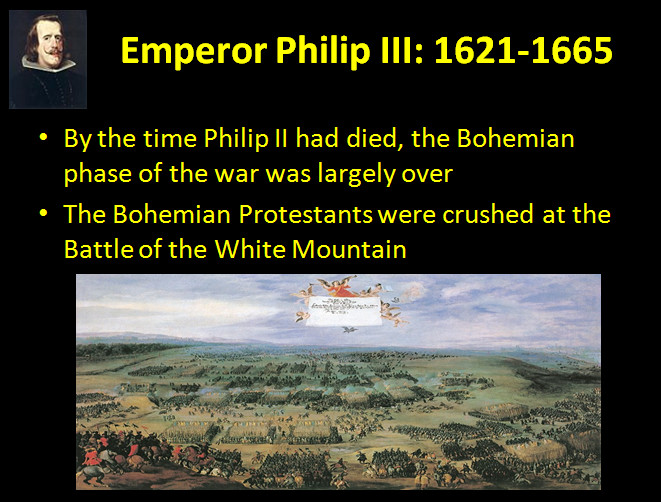
Just a short slide on the Bohemian phase of the war. By 1621, outside interference in the war was minimal, with other nations only sending mercenaries and supplies. By the time Philip III was crowned, the Bohemian revolt had been put down, largely due to their devastating loss at the Battle of the White Mountain.
But the defeat of the Bohemians in 1621 did not stop the Brandenburgians and Dutch from continuing their rebellion. The Bohemian Protestants were a bit isolated, while the northern coast of the Empire was a Protestant stronghold. The Brandenburg revolt was not put down until they were defeated. Again, just like at the White Mountain, the Imperial mastermind Johann Tserclaes defeated the Protestants. But the Dutch, with the sea access allowing constant help from the Scandinavians and French, were actually able to hold out against Imperial incursions for the entire war.
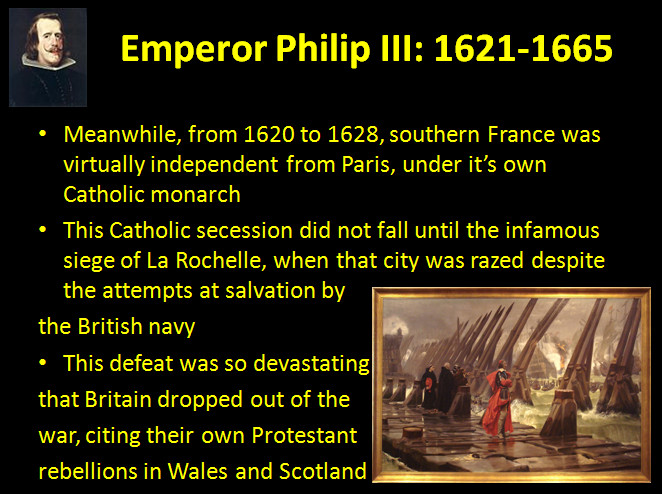
While much of this was going on, Catholics revolted in southern France, led by a variety of pretender kings, many of whom names have been lost to history. Nevertheless, the Catholic Occitan revolt served as a distraction for the French, not to mention that it facilitated Occitan nationalism for years to come. The Occitan revolt did not end until the French finally captured the city of La Rochelle, and upon its capture a brutal razing took place. The British had invested so much into this revolt, that when it failed, they dropped out of the war.
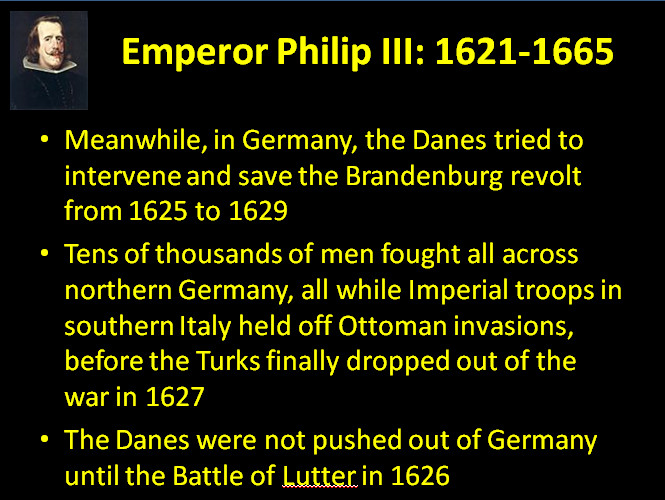
The first major outside intervention was the Danish intervention, which lasted from 1625 to 1629. This stage of the conflict was a back and forth war all across northern Germany. And in keep in mind, that at this time, Imperial forces were holding back Ottoman raids on southern Italy. Again, Johann Tserclaes spearheaded Imperial victory, it is these victories that make him the Imperial hero we know today. He was actually even more famous in his day. After the Danes lost at Lutter in 1626, Tserclaes made some incursions into Denmark itself, laying a short siege on Copenhagen itself, before the Danes surrendered in 1629.
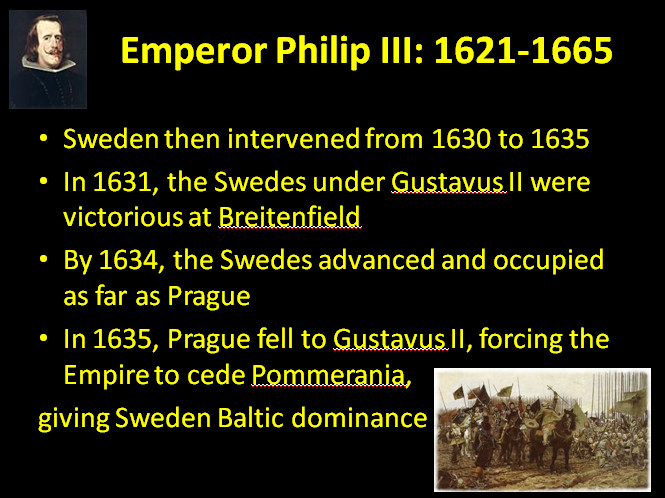
After the Danes failed to take down the Empire, the Swedes tried their hand, under their infamous, or famous king depending on which side your on, Gustavus II Adolphus. He served Tserclaes his first loss at Breitenfield in 1631, and Tserclaes died a year later. Without a strong general, the Swedes were able to run rampant across northern and central Germany, before laying siege to Prague in 1634. A year later, the city fell to Gustavus II, and with the road to Vienna now open, the Empire had to come to the negotiating table. Philip III and Gustavus II met in person, and Philip III was forced to swallow his pride and cede Pommerania.
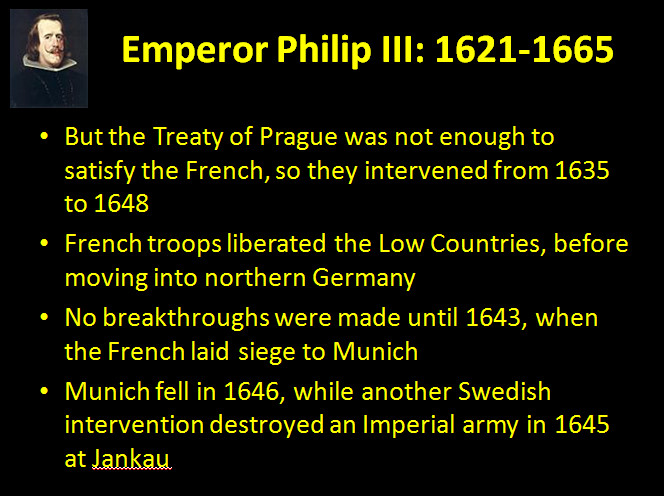
But this treaty wasn't enough for the constantly paranoid French. Thought this is understandable, considering their entire nation was bordered by the Empire. So they intervened in the war from 1635 to 1648. Again, without Tserclaes, the remaining Imperial generals were incompetent, even with Philip III strategic directions. Though they had good orders, it was useless if they couldn't execute them properly. So the French were able to win many battle across the Low Countries and beyond, liberating the Dutch. After this, they moved into Germany proper, and began a slow phase of the war from 1638 to 1643. Back and forth warfare once again raged across the battered land of Germany, until the French broke through the Imperial lines and laid siege to Munich. In 1645, the Swedes, still under Gustavus II, intervened again and defeated the Empire at Jankau. And by the way, Gustavus ruled Sweden for 78 years, living for an astonishing 95 years, from 1594 to 1689. Anyway, Munich fell to the French in 1646. From 1646 to 1648, the French led campaigns in northern Italy and Catalonia, easily gaining victories there, considering the Imperial army was stuck in Germany, not to mention that many Imperial soldiers were dead.
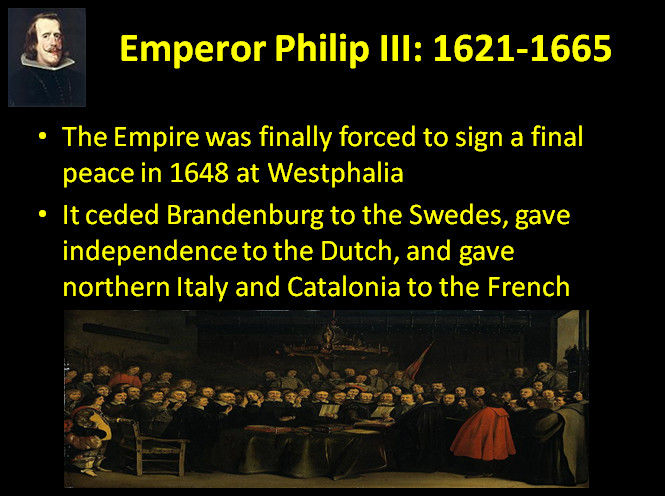
Philip III swallowed his imperial pride once again and signed the Treaty of Westphalia in 1648. He ceded Protestant Brandenburg to Sweden, gave the Dutch independence, and also ceded the occupied areas of northern Italy and Catalonia to the French.
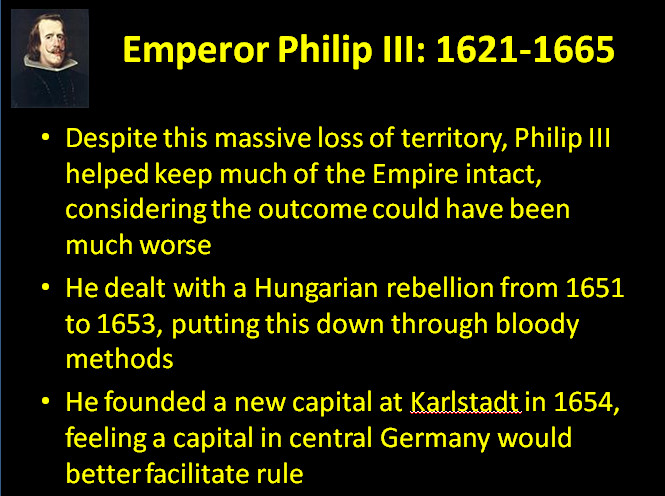
Now some of you may begin to think of Philip III as a bad emperor because of the land losses the Empire suffered under his reign. But we have to understand that he did his best to hold together an Empire doomed to fall due to its diversity, and its problems that had only been exacerbated by his father's ineffective rule. While the Empire suffered greatly under Philip III, in fact it is estimated that the Thirty Years' War ended the lives of over 1.5 million people, Philip III stopped the outcome of the war from being much worse. The war could have absolutely torn apart the Empire or burnt Vienna or given the crown to Sweden. All of this would have certainly caused Spain to secede. All this alternate history is interesting, but the point is that Philip III held the basic fabric of the Empire together despite massive pressure. Now while the majority of his reign was spent fighting the Thirty Years' War, he also put down a Hungarian revolt from 1651 to 1653. The Hungarians wanted to break away from what they felt was an increasingly German empire. But Philip III ended the rebellion by instilling fear in the Hungarian people. The rebel leaders were rounded up, blindfolded, and made to kneel in a row. Then two riders on either side of the line, would each hold one end of a massive saw. As I'm sure you're all guessing, yes, they then rode across, beheading the entire line of freedom fighters in seconds. I'm sure you've all seen this brutal execution during that famous final scene of the movie "Lionheart", about the Hungarian rebel leader Zoltan Balogh. And as we discussed earlier, Philip III founded Karlstadt in 1654. It would serve as a main Imperial residence, but Vienna still remained a ceremonial capital.
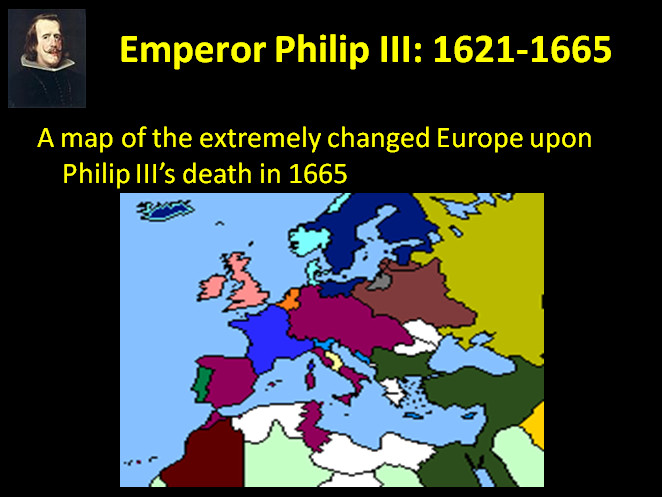
And finally, here is a map of Europe upon Philip III's death in 1665. As you can see, and I forgot to mention this during the lesson, the personal union with Portugal ended in 1640, and since the Empire was at war, it didn't have the resources to keep Portugal within it. Also, much of north Africa was able to regain independence during the war, considering the Empire did not want to divert troops to save their hold over the Sahara. Only Tunisia was able to remain in Imperial hands, mostly due to the efforts of loyal Italian mercenary fighters. And as you might notice, the young Kingdom of Greece expanded at the cost of the Turks. Greece and Russia waged a simultaneous war against the Turk, in which Greece was able to regain Epirus and Thessaly. OK, that brings this long lesson to a close, tomorrow we'll talk about Emperor Charles VI.




